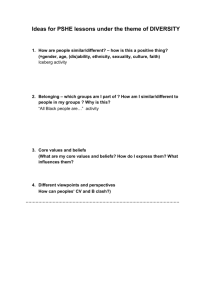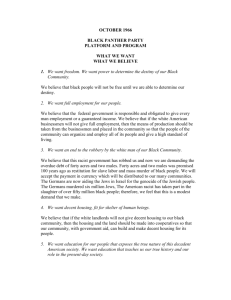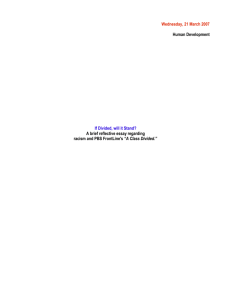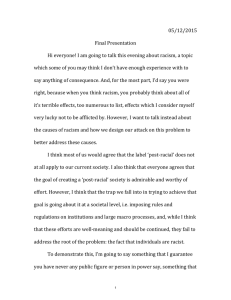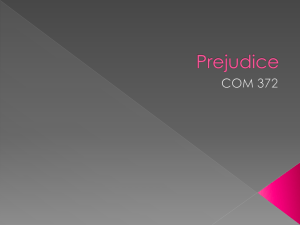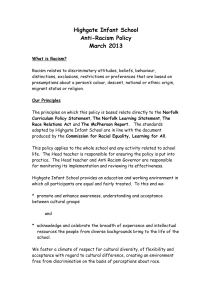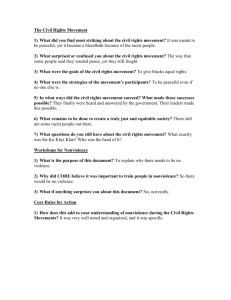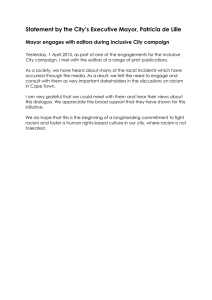24.02 Moral Problems and the Good Life MIT OpenCourseWare .
advertisement
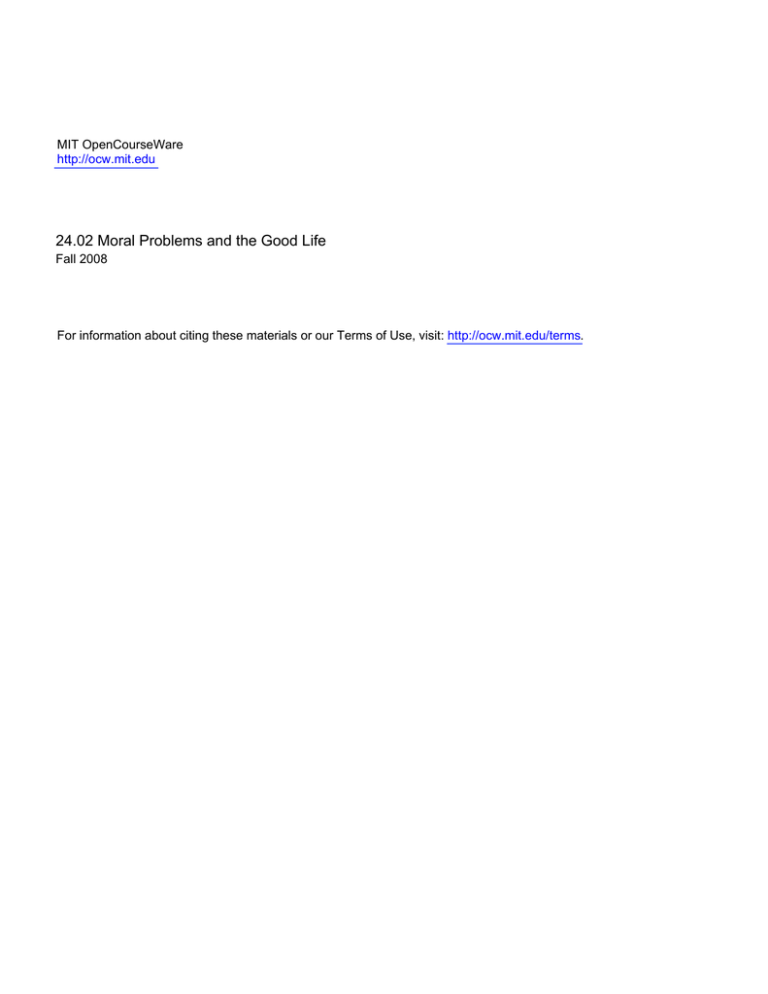
MIT OpenCourseWare http://ocw.mit.edu 24.02 Moral Problems and the Good Life Fall 2008 For information about citing these materials or our Terms of Use, visit: http://ocw.mit.edu/terms. Offensive (Racist, Sexist….) Acts, Offensive Humor I. Recap We have considered a variety of ways of understanding racism and sexism, as concerned with individuals as in, e.g., : Individual Prejudice (Hypothesis 2+): Sexism and racism are a matter of deeply entrenched prejudicial beliefs….that are held in place by a failure of due care and concern. (A failure of the heart and mind.) And as concerned with social structures: Structural Oppression (Hypothesis 4): A cultural or economic structure is sexist/racist if and only if the relations between the sexes/races in that structure are unjust, and there is little or no room for exit from these relations. Last time you considered arguments for and against forms of affirmative action that attempt to address structural oppression. These seem to capture two sorts of moral wrongs that occur in response to race and sex (among other categories), but Michael Philips argues that there are still further sorts of wrongs, viz., wrongful racist or sexist acts that cannot be accommodated by these two definitions. His paradigm is racist or sexist humor. II. Basic Racist Acts Suppose Josh tells a Polish joke, or Jewish joke, or “Dumb Blonde” joke, but is doing so just to break the ice at a party, and doesn’t really believe the negative stereotypes that are presupposed by the joke. Has Josh done anything morally wrong? If we think of racism and sexism in terms of either individual prejudice or structural oppression, it seems not. It would be wrong to consider Josh a racist/sexist. And Josh’s act is not itself an oppressive structure. So is his joking entirely permissible? Philips argues that we should separate the moral evaluation of acts and individuals. Sometimes morally decent individuals perform morally bad acts. To say that the act is morally bad, however, is not to say that it should be illegal or that it is a punishable offense. (It is agreed that adultery is morally wrong, but it is not illegal.) Nonetheless, one should not perform morally bad acts. So what’s so bad about telling a racist or sexist joke? What makes it wrong? Philips defines a Basic Racist Act as follows: P performs a Basic Racist Act by doing A when: (a) P does A in order to harm Q because Q is a member of a certain ethnic group; or (b) (regardless of P’s intentions or purposes) P’s doing A can reasonably be expected to mistreat Q as a consequence of Q’s being a member of a certain ethnic group. (198) • An act A may be a Basic Racist Act without actually harming/mistreating someone, if it could be reasonably expected to. You can’t avoid committing a racist act by being ineffective or lucky. • Mistreatment includes harm (unjustly making someone worse off); it also includes insult, ridicule, humiliation, and the reinforcement of stereotypes that function in prejudice and oppression. • Philips speaks of ‘Basic’ racist acts, because he holds that racist acts are the primary form of racism. Racist beliefs and racist structures are so by virtue of their connection to racist acts. E.g., a belief is racist because it is the sort of thing that tends to result in or support racist action. (198) One can hold that acts, in addition to attitudes and structures, are racist/sexist without holding that the basic form of racism is in action. III. Racism and Truth Suppose that Josh’s joke picks out a feature of group G to make fun of that is statistically more common in G’s than in non-G’s. In other words, suppose that Josh’s joke has a grain of truth to it. Does that make it permissible? 1 Suppose that statistically, females as a whole score lower than males as a whole on certain math entrance exams. Suppose too that the math department is looking for mentors to help struggling students. Is it permissible for them to give a priority to males who ask to be mentors? What about racial profiling? Is it permissible for police to stop Black men more often than women or non-Black men when patrolling an area, because of the proportion of Black men involved with the criminal justice system is higher than with other groups? Philips describes the following case: “You are walking down a dark street in a poor Black neighborhood at night. A large Black man approaches you from the opposite direction. You cross the street to avoid contact.” (200) Is this morally permissible? Is it rational? After all, it seems that you mistreat someone by mistrusting them when they have done nothing to deserve this mistrust. Your attitude towards them is not respectful; you treat them unfairly. Philips argues that, nevertheless, it is rational to cross the street because even though the chances that this Black man will harm you are 25 to 1 (?!), there is sufficient reason to be worried, so it is reasonable for you to avoid contact. He concludes that it is prima facie wrong (or what we have been calling pro tanto wrong) to cross the street, i.e., there are moral considerations against doing so, however, it is (morally?) permissible to cross because there are strong prudential reasons in favor of crossing that outweigh the moral considerations against. He points out that this is one “tragedy of living in a racist society” (201): in order to act reasonably in our own self-interest, we must commit racist acts. “The system creates a set of prudential reasons for all members of the victimizing race to participate in victimization, i.e., to be complicit in the mistreatment of the victimized group.” (200) However, consider: • Racism has the effect of instilling in us false beliefs about the danger Black men (and members of other subordinated groups) pose. It is not plausible that the chances this man will harm you are 25 to 1! This only seems plausible due to racist stereotypes. (See also p. 205) • Even if there are prudential reasons to be cautious, Philips does not consider the challenge of weighing prudential reasons against moral reasons. If I promise you that I’ll pick up your daughter from school, then it would hardly be an excuse to say: sorry I didn’t pick her up. There was a fire at the school this afternoon and I didn’t want to risk being injured. Morality sometimes requires that we take risks. Question: when does it require this? And how great a risk? IV. Racist Humor Philips concludes that “bits of humor” may be racist in three ways (204): (1) They may insult (or be intended to insult), humiliate or ridicule members of victimized groups in relation to their ethnic identity; (2) They may create (or be intended to create) a community of feeling against such a group; and (3) They may promote (or be intended to promote) beliefs that are used to “justify” the mistreatment of such a group. Whether a bit of humor, or another act, satisfies (1-3) will depend on context. In some cases it will depend on the attitudes of the group that is the target of the joke or treatment. Philips maintains that “One may insult without saying or doing anything that is “objectively insulting”.” (203) If a group is offended by being portrayed or treated in a certain way, and there is no overriding reason to do so, we owe it to them to be sensitive to their concern. (203) Questions: 1. Do acts of humor really have the causal impact in supporting racism and sexism that is suggested by Philips argument? What if you just repeat a sexist joke to your roommate. Is that morally wrong? 2. What if members of the group around you don’t really care if you tell the joke, i.e., if they laugh too and don’t feel insulted. Is it morally wrong? Is it wrong for blondes to tell “dumb blonde” jokes? Is it wrong for members of ethnic groups to tell jokes that demean or insult members of their own group? What about racist or sexist epithets? Is it wrong for members of a group to use them towards others in their group? 2
